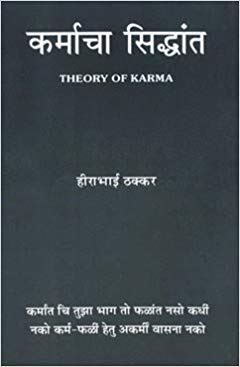The Indian
Literary Scenario in terms of Book Shops continues to amaze me with its rather
myopic focus away from good Indian Literature; and its single minded focus on newer
imported books. There is no issue in keeping & selling good foreign books –
any good book is more than welcome. But when I tend to find masterpieces on the
footpath, both Western & Indian {Peter Drucker, Kuldeep Nayar and more} –
but absent in books stores, I kind of wonder at the Business Model these companies
have. They are not developing the market; just milking it! That is why I have made it a habit to visit the footpath bookstores –
they are far better than nearly all of the – aah – good book stores and online
stores put together in terms of quality books available. The current book under
review - कर्माचा सिद्धांत by Hirabhai Thakkar - was picked up from a footpath as well – which is
why I am pointing this out.
Note : In the review below, GyaanYog & DnyaanYog are the same; we
in Marathi pronounce Gyaan as Dnyaan
THE BOOK
I have always wondered at
the concepts of the Shrimad Bhagwad Geeta
and its interpretation; especially at the concept of Yog, which path to choose –
Bhakti, Karm or Gyaan Yog - and how to
apply it in real life. Further, the Geeta focuses on Karm, almost throughout;
and I could never fully appreciate the impact of Karm in the modern world. The
questions remained in my mind : How is KarmYog different from Dnyaan Yog? How
does one develop true Bhakti? Further, in my arrogance born out of years of
reading the Geeta, I thought I understood the concept of Karm – well, suffice
it to state that my arrogance has been smashed quite comprehensively, by one of
the most fantastic dissertations on The Shrimad Bhagwad Geeta it is has been my
priviledge to read. And, I picked this up
from a footpath; amazing our bookstores didn’t get this!!!!
This is a Gujarati Book,
translated to Marathi – and deals in depth with the concept of Karm, and goes
into a deep dissertation of this topic in 102 short pages. The base is the
Geeta, which is the most refered document in the book by some distance. The
book is available in English, Marathi & Gujarati on Amazon - but not on any physical book store that I
recall. {I read the Marathi translation} The book is deep yet easy to
understand for anyone – I don’t think you need to be a daily reader to
appreciate this short but powerpacked masterpiece. This is an excellent
resource book.
The initial part of the
book introduces one to some new concepts – Sanchit, Prarabdh, Kriyamaan karm;
this is not found in many books or Geeta versions. I would rather you read this
yourself – what are these concepts, as this cannot be done justice to in a book
review. The good part is that in this book, these have been explained in exhaustive
detail, making it an excellent resource book. It then goes deeper into familiar
territory – for example, what is True Yog, Gyaan, and how can one acquire Gyan?
How is the desire for Gyaan awakened? How is it strengthened?
It delves deep into the 3
Yog paths – KarmYog, BhaktiYog and DnyaanYog {GyaanYog}; this part is the frontispiece
of the book. Read it especially for this. Personally, my biggest takeaway has
been the answer to a question I always had : I could not understand how one can
walk on KarmYog without DnyaanYog; luckily, I was able to appreciate this in
this book, where I learnt that one has to successfully walk on all three paths
in reality. It also does a wonderful job of listing and describing both the
nature of True Dnyaan, Tatvadnyaan and how to acquire it in a simple easy to
appreciate prose.
The best, most powerful
part was the difference between the Bhakt and the Dnyaani – that the Bhakt is
dependent on and trusts God, while he does not yet have the full capacity to
walk alone. Whereas, the Dnyaani has to walk alone till he reaches, as God
considers that this person has the ability to walk the talk. Such a simple and
beautiful yet clearly intuitively logical approach! The simple differentiation
described after detailed examination captures it all : KarmYogi says I belong
to God; BhaktiYogi says, God is mine; and the DnyaanYogi says “I and God are
one”!
CONCLUSION
There is much more in this
book; I have just touched the high-points &highlights which appealed to me
the most, from which I learn the most. Quite literally, each page is bursting
with pertinent and fascinating prose. Special mention must be made for the
extensive use of superb pertinent examples that drive home the concepts
explained. This is a rare book; easily a
masterpiece. If you are a reader of the Shrimad Bhagwad Geeta, or if you have
wondered about Karm, or are interested in learning of these – then this book is
a must read. I rate it at 5-stars, one of the finest books on philosophy I have
ever read. And- don’t ignore the footpath
bookstores … sincere advice!


Nice
ReplyDelete